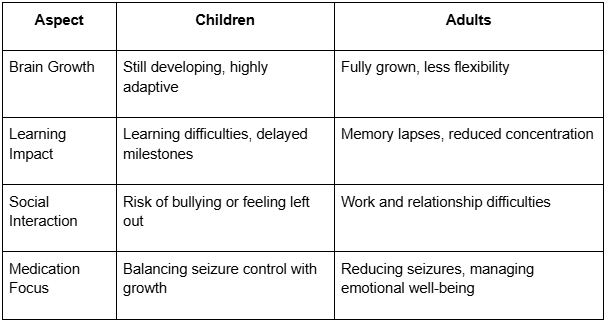When we think about epilepsy, most people imagine sudden seizures or convulsions. But there’s much more to this condition, especially when it comes to how it impacts children and adults in very different ways. Epilepsy isn’t a one-size-fits-all diagnosis. Whether it’s a child learning to navigate school life or an adult managing work and relationships, the condition shapes their experiences uniquely.
Understanding these differences is essential to provide the right care and support, ensuring a healthier life for everyone affected.
What Exactly Happens in Epilepsy?
Epilepsy happens when the brain’s electrical signals don’t function normally. These irregular signals cause sudden bursts of activity known as seizures. While some people may have a brief lapse in awareness, others experience uncontrolled movements or strange sensations.
In India, epilepsy remains a significant health challenge, affecting millions. Despite increased awareness, many people still face stigma or lack access to proper medical care. Early diagnosis is important, as it helps prevent complications and improves quality of life.
How Epilepsy Impacts Children Differently
For children, epilepsy often interferes with more than just brain activity. Because their brains are still developing, the condition can impact their ability to learn, communicate, and socialize.
Typical Effects Seen in Children:
- Trouble focusing in school
- Delay in reaching developmental milestones, like walking or talking
- Changes in mood or behavior, such as irritability
- Feeling isolated due to fear of public seizures
Children face a unique challenge in balancing school, play, and social life, especially when their peers don’t understand epilepsy. This makes it harder for them to feel accepted.
Doctors often prescribe medications to help control seizures with fewer side effects, allowing children to grow without major disruptions to their development.
Parents play a key role by ensuring their child follows the treatment plan, avoids known triggers, and receives emotional support.
The Unique Challenges Adults Face with Epilepsy
In adults, the experience of epilepsy tends to shift focus from learning and development to managing everyday responsibilities.
Common Struggles in Adults:
- Difficulty remembering tasks or focusing at work
- Anxiety about having seizures in public places
- Increased risk of depression
- Driving restrictions due to safety concerns
Unlike in children, adult epilepsy can often result from factors like brain injury, infections, or stroke later in life. Treatment for adults commonly includes medicines, which helps balance the brain’s electrical signals and reduce the chances of seizures.
Managing mental health becomes crucial, with counseling or therapy often recommended alongside medication.
Clear Comparison: Children vs. Adults

Tailored care ensures both children and adults get treatment suited to their life stage.
How Families Can Support Epilepsy Management
Managing epilepsy isn’t just about medicines, it’s a whole lifestyle approach. Family and caregivers play an essential role.
Helpful habits include:
- Keeping a seizure diary to identify triggers and patterns
- Ensuring a safe home, such as padding sharp corners
- Encouraging regular, light exercise to improve overall health
- Being patient and offering emotional support, especially during difficult times
These small steps help children and adults feel safer and more confident in managing their condition.
Why Early Diagnosis Makes a Difference
The sooner epilepsy is diagnosed, the better the chances of managing it effectively. Doctors use EEG (Electroencephalogram) tests to detect abnormal brain activity and MRIs to identify structural issues.
Once diagnosed, doctors recommend a treatment plan that may include medicines like Briviact 100mg which contains Brivaracetam along with lifestyle adjustments.
In India, there’s growing awareness about epilepsy, but rural areas still face challenges in accessing proper care. Early diagnosis, therefore, remains a key step in improving outcomes and quality of life.
Healthy Habits That Support Brain and Body
Keeping the brain and body healthy helps prevent seizure triggers and supports long-term well-being. Simple yet effective habits include:
- Going to bed and waking up at the same time every day
- Eating a balanced diet with fresh fruits, vegetables, and whole grains
- Avoiding alcohol or recreational medications.
- Managing stress through activities like yoga or meditation
Additionally, focusing on bone and joint health strengthens posture and breathing mechanics, making the body more resilient. Strong muscles and bones help maintain good posture, which supports better lung and brain function, indirectly benefiting seizure control.
Maintaining good bone and joint health plays an important role in overall wellness.
Takeaways
Epilepsy affects individuals differently depending on their age. For children, it may hinder learning and social development, while adults may face memory difficulties, anxiety, or job challenges.
Medications are essential tools in managing the condition, but lifestyle adjustments, early diagnosis, and emotional support are equally vital.
By increasing awareness, focusing on preventive habits, and encouraging regular medical check-ups, individuals with epilepsy can lead fulfilling lives without letting the condition hold them back.




